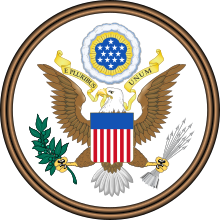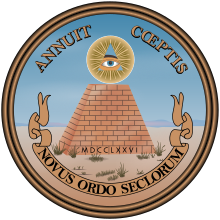Great Seal of the United States
| The Great Seal of the United States | |
|---|---|
 |
|
| Versions | |
 |
|
| Details | |
| Armiger | United States of America |
| Adopted | 1782 |
| Crest | A glory Or, breaking through a cloud proper, surrounding an azure field bearing a constellation of thirteen stars argent |
| Escutcheon | Paleways of 13 pieces, argent and gules; a chief, azure |
| Supporters | A bald eagle proper displayed, bearing in its dexter talon an olive branch, in its sinister talon thirteen arrows, and in its beak a scroll bearing the motto |
| Motto |
E pluribus unum (obverse) Annuit cœptis and Novus ordo seclorum (reverse) |
| Other elements | The reverse bears "A pyramid unfinished. In the zenith an eye in a triangle, surrounded by a glory, proper." |
| Use | On treaties, commissions, and more |
The Great Seal of the United States is used to authenticate certain documents issued by the U.S. federal government. The phrase is used both for the physical seal itself (which is kept by the U.S. Secretary of State), and more generally for the design impressed upon it. The Great Seal was first used publicly in 1782.
The obverse of the great seal is used as the national coat of arms of the United States. It is officially used on documents such as United States passports, military insignia, embassy placards, and various flags. As a coat of arms, the design has official colors; the physical Great Seal itself, as affixed to paper, is monochrome.
Since 1935, both sides of the Great Seal have appeared on the reverse of the one-dollar bill. The Seal of the President of the United States is directly based on the Great Seal, and its elements are used in numerous government agency and state seals.
The design on the obverse (or front) of the seal is the coat of arms of the United States. The shield, though sometimes drawn incorrectly, has two main differences from the American flag. First, it has no stars on the blue chief (though other arms based on it do: the chief of the arms of the United States Senate may show 13 or 50, and the shield of the 9/11 Commission has, sometimes, 50 mullets on the chief). Second, unlike the American flag, the outermost stripes are white, not red; so as not to violate the heraldic rule of tincture.
...
Wikipedia
